Become a Creator today!Start creating today - Share your story with the world!
Start for free
00:00:00
00:00:01

Arthur Conan Doyle (part 3)
Canadian mystery novelist Vicki Delany, and author of the Sherlock Holmes Bookstore cozy mystery series, joins Brook and Sarah to discuss writing in the Sherlock Holmes space.
Find Vicki at: http://vickidelany.com/
Other references:
The Agency Mysteries Series by Y.S. Lee
Brook’s Edgar and the Raven’s T-shirt
For more information: cluedinmystery.com
Instagram: @cluedinmystery
Contact us: hello@cluedinmystery.com
Music: Signs To Nowhere by Shane Ivers - //www.silvermansound.com
Transcript
Introduction and Guest Excitement
00:00:10
Speaker
Welcome to the Clued in Mystery podcast. I'm Sarah. And I'm Brooke. And we both love mystery. So Brooke, we've covered Doyle now in two episodes. And one of the things that we discussed was the adaptations and the variations of his work. This week, I'm super excited because we have Vicki Delaney joining us, who will talk about writing in the Sherlock space in her Sherlock Holmes bookshop series.
00:00:37
Speaker
I'm so excited to meet Vicky and talk to her about this wonderful series that plays in directly to the conversations that we've had about Doyle. It's going to be so much fun. And I'm so thrilled to have such an accomplished author join us on our young little podcast.
Vicki Delaney's Background
00:00:54
Speaker
So am I. So let's do it.
00:00:58
Speaker
Vicky Delaney is one of Canada's most prolific and varied crime writers and a national bestseller in the US. She has written more than 40 books, clever cozies to Gothic thrillers to gritty police procedurals to historical fiction and novellas for adult literacy.
00:01:13
Speaker
She is currently writing four cozy mystery series, the Catskill Summer Resort Mysteries for Penguin Random House, the Tea by the Sea Mysteries for Kensington, the Sherlock Holmes Bookshop Series for Crooked Lane Books, and the Lighthouse Library Series as Eva Gates for Crooked Lane.
00:01:30
Speaker
Vicky is the past president of the Crime Artists of Canada and co-founder and organizer of the Women Killing at Crime Writing Festival. Her work has been nominated for the Derringer, the Bonnie Blythe, the Ontario Library Association Golden Oak, and the Arthur Ellis Awards. Vicky is the recipient of the 2019 Derek Murdoch Award for contributions to Canadian crime writing. She lives in Prince Edward County, Ontario.
Sherlock Holmes Bookshop Series Overview
00:01:54
Speaker
Welcome, Vicki. We're so happy to have you here. Hello, ladies. This is so exciting. Thank you very much for inviting me. You are welcome. Before we get into our questions, I'm hoping that you'll share with our listeners just in case they haven't had the treat of finding the Sherlock Holmes Bookshop series yet, if you'll just share kind of the premise and the setting of the series.
00:02:17
Speaker
Sure, I'm happy to. Thank you. The Sherlock Holmes Bookshop series is, as the title suggests, set in a Sherlock Holmes themed bookstore. Now, this is a cozy series. I'm sure most of your listeners don't need any introduction to what a cozy is. So briefly, meaning it's light, it's intended to be light, it's intended to be funny, no hardcore violence, no international terrorists or anything like that.
00:02:39
Speaker
So the main character is an English woman by the name of Gemma Doyle. The last name is very significant, who owns the Sherlock Holmes bookshop and Emporium. And the book store is dedicated to all things to do with Sherlock Holmes. And when I first started the series, my idea originally was just to
00:02:58
Speaker
have an interesting bookstore for my character and then I thought well Sherlock Holmes bookstore would be interesting and I thought well how feasible would it be to have a store just dedicated Sherlock Holmes and I kind of pretty quickly realized that's very feasible. I mean there is so much not only in terms of books but in all the paraphernalia that goes along with it you could easily stock a bookstore with nothing but Sherlock Holmes.
00:03:23
Speaker
I was hoping that this was a real place that I could go and visit, actually, because it sounds so much fun to be. That would be fun. So there are, I believe there are seven books published in the series right now. And one thing I should also mention is that the main character, Gemma Doyle, is the Sherlock Holmes character.
Vicki's Journey into Mystery Writing
00:03:42
Speaker
So she's written in an imitation of Sherlock Holmes. She's my interpretation of what Sherlock Holmes would be if he was a modern young woman. And I have enormous amount of fun doing that.
00:03:52
Speaker
Oh my goodness, yes, I bet you do. And the stories are so charming. The characters are just really fun. And the different viewpoints that they have on Sherlock is just sort of precisely what Sarah and I have discussed in some of our previous episodes. So it's kind of encapsulated in your series, which was a really fun read. When did you first fall in love with mystery, Vicky? And when did you then start writing in this space?
00:04:18
Speaker
Oh, I've certainly read mysteries for a long, long time. You know, certainly I wouldn't say all my life, but I've probably read mysteries most of my adult life. My original idea when I thought I wanted to be a writer is I thought I'd write for children. So I started looking into, I had an idea for children, because I have three daughters of my own.
00:04:37
Speaker
So I started looking into children's books and writing for children and I decided to take the course at Community College on creative writing and I fairly quickly realized I didn't want to write for children But I was rather than give up. I was really enjoying the course So I thought well, you know, I want to stay in this course. I have to write something. So what will I write? Well, I read mysteries Maybe I'll try my hand at a mystery. So anyway, it all went from there and I now have 45 published books that my
00:05:02
Speaker
book that came out in January called A Three Book Problem, which is the Sherlock Holmes Bookshop Mystery, was my 45th published book. Oh, congratulations. That's exciting. That's a funny story because I had the exact same experience. I was in a children's writing course and same. I was like, well, you know, this probably isn't my best voice, but I will
00:05:24
Speaker
write a mystery if I'm in the class. And it actually ended up being great fun and I'm going to be continuing that series. So it was something I learned along the way. Very similar. Yeah, that's fun. Have you yourself been a long time fan of Doyle's Sherlock Holmes?
00:05:41
Speaker
Yeah, I think I have been. It's hard for me to remember when I exactly became aware of Sherlock Holmes, but I certainly watched the Jeremy Brett series when they were new, like when they were originally aired, way back when. And so it's probably the Jeremy Brett series that made me really love Sherlock Holmes.
00:05:59
Speaker
So I have read all of the all the books in the canon. I've seen many movie and TV interpretations, although by no means all. Like everybody, I have things I like and things that I don't like. But yeah, so I've probably been.
Incorporating Easter Eggs and References
00:06:15
Speaker
I was giving a talk once in public, and I said something about someone asked me if I was a Sherlock fan. And I sort of said, no, no, not really. And one of my daughters piped up and said, Bob, you've always been a Sherlock fan. So OK. That's cute.
00:06:30
Speaker
I think that's an interesting, when you let off, you said, I can't really remember when, because it's so pervasive, right? Sherlock is so pervasive in our culture and in our, almost like our mythology of our culture. So it is hard to put your finger on when you ever discovered Sherlock Holmes. I've never met anyone when I give talks about writing who's ever said to me, who's Sherlock Holmes?
00:06:58
Speaker
Yeah, for sure. But everybody knows, right? Yeah. Talk to us a little bit about your main character, Gemma Doyle. You alluded at the beginning that she's sort of the female emulation of Sherlock. But I remember somewhere in the book that she didn't really consider herself a Sherlockian. So I thought that was an interesting combination.
00:07:22
Speaker
So Gemma Doyle is the main character. She's a 30-something English woman. She moved to Cape Cod because her great uncle opened the Sherlock Holmes bookshop in Emporium and then decided he wasn't really interested in running it. So he lured her over to run the store for him. And she is, yeah, as you said, she is the Sherlock Holmes character. She has that mind. I mean, she has that incredible eye for detail. She has that memory, that logical brain.
00:07:47
Speaker
For good and for ill, she can also be a little bit abrupt to people that aren't following her thought process fast enough. But I've really enjoyed sort of trying to get into that Sherlock mindset. And at first I thought to myself, I don't really think, I mean, I don't think like that. How can I, how can I do that in my writing? But in fact, it's quite easy to do in writing because I have all day to set the scene, right? What Sherlock Holmes or Gemma Doyle notices in an instant, I could, you know, I set that up.
00:08:15
Speaker
days ahead of time. Really easy to do in fictional though it's definitely not in life and that's been interesting and even the little things like she goes out for ice cream and I think what would Sherlock Holmes want for an ice cream cone? Well he'd probably have french vanilla you know so I've enjoyed doing that quite a lot. There was a second part to that question which I forgot
00:08:33
Speaker
I think that there's a reference in the book that I read that she didn't necessarily consider herself a Sherlockian. And is that the case? Do I have that right? Yeah, that's right. She doesn't necessarily consider herself a Sherlockian. And in fact, neither do I, because there are people that
00:08:49
Speaker
are really intensely into it and can discuss the minutae of the stories and you know all the details and and I'm not like that I've read them and enjoyed them and I still do and I sort of wanted her to be like that I don't really even know why I think I just didn't want to get the book into intense discussions of Sherlock things because the books are not intended to be for lovers of Sherlock
Adapting Sherlock Holmes for Today
00:09:12
Speaker
Holmes
00:09:12
Speaker
I've written them so that people that really know the Sherlock Holmes canon can sometimes find little Easter eggs and things. There are, for example, 17 steps in the shop, between the shop and the offices. Gemma's older sister is seven years older than her. Those are little Easter eggs, but it doesn't spoil your reading of the book, not to know that there are 17 steps in 221B Baker Street, for example.
00:09:35
Speaker
So I guess I just was leery of not wanting to get too off track and leading into actual Sherlock Holmes things. Because it's not intended to be a Sherlock Holmes book. It's a book about someone who owns a Sherlock Holmes theme books.
00:09:50
Speaker
Yeah, I love that. I think that's such a great way to handle it. And it also is some really good advice, I think, for other authors. You don't have to know something inside and out and be the world's expert on it to use a theme and carry it forward.
00:10:06
Speaker
There are no clues in the books that you need in my books that you need to be familiar with Sherlock Holmes to get, you know, there's nothing like that. And one example in one of the books, they're auctioning off in a first edition of Valley of Fear. And someone did ask me, well, do I have to read that first? No, absolutely not. There are no clues relating to the actual book. It's just a drop name of the book. That's all.
00:10:28
Speaker
But I do think that it could get people, it could work in the reverse. For instance, maybe a younger reader who hasn't read a lot of the original stories might get really excited about Sherlock Holmes or Doyle's Sherlock Holmes, I should say, from your books and then go back and read some. So that's kind of a nice marriage between the two.
00:10:49
Speaker
In the books, she quite often, because she owns a bookstore. So books are mentioned quite often as things that she sells in the bookstore. And I will say that everything that's mentioned in my books exists in the real world. All the books that she sells, all the stuff that she sells, I've actually found those in the real world. And I have actually had people write to me
00:11:10
Speaker
Particularly when I mention a book for a YA audience, someone will come into the store and say, I'm looking for, you know, a birthday gift for a 12 year old girl. And Gemma will say, well, have you read the series by Yang Li? And I've had people write to me and say, oh, I went out and found that book for my 12 year old, and she really enjoyed it. So that's really great. I like that a lot.
00:11:30
Speaker
Yeah, I really do enjoy it. I loved the name drops and the mystery series suggestions and the author name drops that you do. I thought that was so charming. And also, you know, I think that we do live in a world where we want to help each other as authors. You know, if we see something that we really love, we want other readers to know about them. We tend to help each other out in this world of mystery writing. Are those always
00:11:56
Speaker
some of your favorites or even maybe authors that you know personally or do you just choose depending on what the story needs? Actually it's both and it's not even yeah it's both so I always I don't recommend any of these books because some of them I haven't even read but some of them I have so yeah my favorite certainly you know the best names are Laurie Arking for example she's, Gemma Doyle is always selling Laurie Arking books and some of the the short story collection
00:12:22
Speaker
And I just remember the name of the series that I'm referring
Why Sherlock Holmes is Widely Adapted
00:12:25
Speaker
to. It's the Agency Mysteries by Y.S. Lee. And Ying Li happens to be a personal friend of mine, so I'm more than happy to, you know, name drop her books in my book. So it's a combination of both, some of which I just look to see what's new. If somebody attracts my attention on Twitter, for example, there's a new Sherlock Holmes theme, you know, blah, blah, blah. Or it doesn't have to be Sherlock Holmes. What sort of what she sells in the it's also called like gaslight fiction stuff set in the time of Sherlock Holmes.
00:12:51
Speaker
So, you know, so I'm looking also for books that are contemporary that would sell in a regular bookstore. Yeah. Yeah. It's it's a great it's a great little speaking of Easter eggs. It's kind of some fun Easter eggs that you hide in there. Your characters argue amongst themselves to the degree at which it's okay to kind of change the Sherlock character in contemporary stories and
00:13:15
Speaker
Was there anything that you felt was sort of untouchable or did you feel like you could kind of put your spin on most things? The one thing that's really untouchable is Sherlock Holmes drug use. We know that he has a 7% solution when he feels bored. He basically takes drugs and I'm not going anywhere near that because it's a cozy series for one thing. So, you know, my character doesn't drink. She doesn't take drugs. She doesn't even smoke cigarettes. And I'm not even going to refer to that. So that's strictly out of bounds. Yeah.
00:13:43
Speaker
Yeah, yeah, I would agree with that. It doesn't fit into a cozy at all. So we've discussed in some of our other episodes the way that Sherlock's character has been adapted in endless ways, different eras. You know, in your series, the character is a female instead of a male, different settings.
00:14:04
Speaker
But then Agatha Christie's adaptation seemed to really stick pretty close to the original stories, original time eras, original character portrayals. Do you have any feelings of why that is? I've been actually thinking about that.
00:14:20
Speaker
First of all, I'll say that Agatha Christie's influence is probably more almost under the table or something, meaning that the style of mysteries that we read today, what we call traditional mysteries or cozy mysteries, are very, very much based on what Agatha Christie piloted almost or began.
00:14:41
Speaker
So the style of her writing is way more popular, perhaps, than her characters, although, of course, the characters are still hugely popular. But I think with Sherlock Holmes, and we could certainly debate why, it's just so much...
00:14:57
Speaker
Yeah, there is. It's not just interpretations. But for example, you know, in the in as I've learned writing the bookshop series, there are, you know, I mean, everything to do with Sherlock Holmes, you can buy games, puzzles, clothes, teacups, mugs, socks, I own it. I own Sherlock Holmes theme socks. You don't get that array of stuff.
00:15:15
Speaker
There are almost anybody else that I can think of, including Agatha Christie or any other classics, plus all the books with all the adaptions and not just Sherlock himself, of course, but interpretations of Sherlock, such as mine, and then all the TV series and all the movies. So your question is sort of, why is there all that?
00:15:33
Speaker
And I don't know, maybe it's just because I guess in some way his personality has just captured people's attention so much. I think it might have a lot to do with the setting that sort of Victorian London, you know, horse drawn cabs and cobblestone streets and, you know, foggy, foggy, wet streets is probably a large part of what captures people's attention as well. So why he's the one that took off to such an enormous degree.
00:16:00
Speaker
I really can't say, but I do think, as I said, Agatha Christie's influence is perhaps more subtle in that people are directly copying her writing. Many, many authors, if not most mystery authors today, are pretty much directly copying her style without consciously copying her style. She set the template, shall we say.
00:16:19
Speaker
Yes, yes. Yeah, those are all great theories. I think you're right. And it is sort of a mystery why Sherlock is so enduring and the one that has taken off this way. But we're sure glad that he has because it's great fun. And one of my other series, the Lighthouse Library series that I write as Eva Gates, because it said in the library, one of the themes of that series is whatever the classic novel book club is reading,
00:16:44
Speaker
is reflected in the plot of the books. And the one that I'm writing right now, they're reading Edgar Allan Poe and the murders on the Rue Morgue with Auguste Dupont. I don't know how to pronounce it. My French accent's not very good. Auguste Dupont is the character. And he's very much, I was surprised at how he was written before Sherlock Holmes and how much he's liked Sherlock Holmes. Absolutely. Even the plot is slightly like the plot of The Sign of Four. So I've been speculating about that. And the thing is, Dupont only appeared in one story.
00:17:13
Speaker
So if Paul had carried on with Auguste DuPont in writing a whole lot of stories, would that be the person that we were talking about today? And that guy named Sherlock Holmes would be largely forgotten. So there's also the thing, of course, about Holmes, there's actually 60 short
Endurance of Mystery Classics
00:17:29
Speaker
stories and novels. So you need, in order to have kind of an almost, shall we say, cult following, you need to have a pretty good amount of material. So 60 stories gives people a lot to talk about.
00:17:40
Speaker
Absolutely. Yeah, that's a neat theory. I personally am a huge Poe fan. My t-shirt, I have an Edgar Allen Poe t-shirt on today. But that's great. That's a good way to think about it. If he had continued to write that character, would it have taken off? And I also think that because of the way that Doyle's stories were told in such a
00:18:04
Speaker
accessible way through the Strand magazine you know it was sort of easily to get your hands on and each week or so you have a new story and it was sort of just spoon-fed to us so it was just in our hands and you're right a huge cannon of stories
00:18:21
Speaker
I also think that the character of Dr. John Watson is absolutely critical, I think, to the success of those stories. He's us. He's slightly befuddled, always, you know, always loyal. Ever confused and always loyal is what I say about Jane Wilson, who's Gemma Doyle's sidekick. But those characters are us as we watch the great mind doing things. So as a reader, we can relate much better to
00:18:47
Speaker
Dr. John Watson, the weekend to Sherlock Holmes himself, who can be, let's put it bluntly, a little bit full of himself. I think that has helped a lot with the popularity of those books. Yes, for sure. I always feel better when I get to the Watson characters, you know, confusion. I think, yeah, that's how I feel right now. So they are, the Watson characters are us in the story, us as the reader in the story. That's awesome.
00:19:14
Speaker
I think in the Jeremy Brett portrayals, there were two actors who played John Watson, and they both did a superb job of looking confused, just their facial expressions as they watched Sherlock Holmes go about things, the way they react and how they're just befuddled all the time. So I do think that's a pretty powerful reason why those books are so popular.
00:19:33
Speaker
Yeah, that's wonderful. I agree. Well, I think you kind of already answered this, but if there's anything you'd like to add to why you think readers continue to love the classic mysteries like the classic mystery writers like Christie and Doyle.
00:19:48
Speaker
Because I really do think that they set the bar in terms of a traditional mystery. I mean, mysteries have diverged in many ways since then. But the traditional mystery, which is the classic puzzle-based mystery, where the clues are all laid down, that the astute reader has a good chance of solving the crime slightly before, at the same time, the protagonist does. And that's set a template for how to write that kind of a book. And I think people enjoy
00:20:17
Speaker
So they are originals in terms of mystery writing and mystery world.
Appeal of Historical Mysteries
00:20:22
Speaker
And I think people often enjoy going back to see, you know, how how it all began, shall we say, you know, the characters are they're classic for a reason, classics, because people still want to
00:20:33
Speaker
want to read them. And we know those names, not only Sherlock Holmes, but you know, Lord Peter Whimsy and Miss Marple and all those characters. We don't know them for a reason. And that's because they do speak to us and they do still appeal to us all these years later. A reflection of a different world, but still a world that in many ways is like ours. I agree. And you mentioned earlier that Victorian era, it's just, it's kind of haunting and charming and
00:21:00
Speaker
We just kind of love to, I think mysteries set in historical times are just always going to be popular because it's fun. It's fun to look back. One of the things about Sherlock Holmes too, and maybe some of the other ones, is in our high tech age, it is nice to watch people that are solving a mystery or any kind of a problem using basically nothing but the power of their mind and, you know, maybe a little magnifying glass that Sherlock Holmes doesn't have all that fingerprinting.
00:21:26
Speaker
and, you know, fingerprint analysis and DNA and cell phone signals and everything, which is actually part of the appeal for me of writing a cozy series. I used to write a police procedural series and I don't write anymore and I don't write cozies. And part of the appeal for me in writing the cozies was that I don't have to I don't have any of that stuff. The cozy character doesn't have access to DNA analysis and she wouldn't understand it even if she did. So all she's doing is solving the mystery by studying people's behavior.
00:21:55
Speaker
Yes. Yes.
Crafting Cozy Mystery Titles
00:21:56
Speaker
I agree. It's a lot of fun to have the low-tech crime solutions like the classic mystery writers. Yes. One thing we like to talk about with, or we have talked about with Kristian Doyle was how they construct and how they write their mysteries, kind of their writing habits. What about you? How do you start? Do you start with the crime? Do you start with the sleuth? How do you put together a story when you're going to start fresh?
00:22:26
Speaker
Okay, so that's actually a good idea. Particularly with the Sherlock Holmes books, there's almost a theme that I'm trying to hit. When I think about it, like the one book that I'm writing right now, which will be number nine, is a question of, is there a haunted, it's an old house, is it haunted? So I have the haunted house. In a three book problem, it's the English country house weekend. In one of the books, it's the visiting author visiting the bookstore. Then there's the theatrical troupe that has a murder. And then there's the yacht club. So I've sort of tried to,
00:22:55
Speaker
grab that one concept. So for example, in the book I'm working at right now, I wanted to do a haunted house mystery. So that's how I started with it there. Is the house haunted? That's the question. It might not be. It might just appear to be. So I started with that. And then I have to think about, well, how do I get my characters involved in this?
00:23:15
Speaker
a haunted house that may or may not be haunted. And as one of the earlier books had to do with the local museum, there was a fire and they had a charity auction and there's a murder happens at the charity auction. So I had that setting already. I had the historical house. So what's better to be haunted than a historical house? So I set the whole thing sort of up.
00:23:36
Speaker
Brick by brick. It's building, you know, bit by bit. And that sort of people will often say, as any writer will tell you, where do you get your ideas? So it's not the idea that it's so hard. I've just told you in one sentence what my idea is behind the forthcoming book. It's the 80,000 words to expand that idea is where the hard work is. So yeah, where do I go from there? That's where the hard work is. Oh, that's so fun. If anybody has a good idea, let me know.
00:24:04
Speaker
Okay, you've put it out there. You might get some emails from people. I'm also getting stuck on titles because what I want for a cozy title needs to be sort of cute and a little bit, you know, often a pun, but something cute-ish. So I want something to indicate that it's got a Sherlock Holmes theme. And I also wanted something to indicate that it's got a bookish theme. And I'm really running out of ideas.
00:24:28
Speaker
Very fast. So if anybody has any ideas for titles, let me know. Yes. That's a lot of parameters to hit. Yeah. But your titles are all very cute and clever. So you've done a great job so far. So I think that you'll have no problem.
00:24:44
Speaker
Some of the titles were suggested to me by members of my the boot makers of Toronto, which is the Toronto Sherlockian Society, who when I started writing the series, I was a little, you know, I didn't want to offend anybody who was particularly attached to the great detective or have them think I was, you know, making fun of them or anything like that. And the books have been really well received by people in Sherlockian societies, I'm pleased to say.
Engagement with Sherlockian Societies
00:25:09
Speaker
So that worked out nicely. Oh, that's wonderful.
00:25:13
Speaker
That's fun. I bet they're very proud to know that they helped inspire some titles too. Well, Vicki, where can our listeners find you and your books?
00:25:26
Speaker
Okay, well, I'm at VickyDelaney.com. I'll spell that out because both my first name and my last name can be misspelled. It's V-I-C-K-I-D-E-L-A-N-Y.com. That's my website. I'm on Facebook at Vicky Delaney and Eva Gates. That's my author page. I'm on Instagram and I'm on Twitter. And my books are generally available where fine books are sold. They're generally available in
00:25:51
Speaker
In most bookstores, the older books are sometimes not, so you might have to ask them to order them, or they're all online as well.
Where to Find Vicki's Work
00:25:58
Speaker
But please use your independent bookstore if you have that chance. That's wonderful. Thank you. Is there anything else that you would like to add, Vicki, that we didn't cover? No, I don't think so. I think that was pretty comprehensive. So it was great. I enjoyed that. I enjoyed that a lot. Anyway,
Hosts Reflect and Preview Next Episode
00:26:13
Speaker
I'd be happy to talk to you again any time. So just let me know, and good luck with the podcast.
00:26:20
Speaker
So Brooke, that was a really great interview. I really enjoyed hearing about Vicky's experiences writing in the Sherlock space, particularly loved hearing about the Easter eggs that she leaves for people who are devoted fans of Sherlock and how the way she's done it so that you don't necessarily have to be a devoted fan to read her stories.
00:26:44
Speaker
Absolutely. And I was actually really interested in the fact that she doesn't consider herself an expert on Sherlock. You know, you and I said that in doing our earlier episodes where we were like, wow, we're a little bit, we have a little trepidation and even talking about it because there are so many people who
00:27:00
Speaker
are so much more knowledgeable than us. And it was kind of a relief to feel like she has that feeling too. Like she doesn't consider herself an expert, but a fan and somebody who can take these characters or in the broad strokes and create a whole new contemporary series. She was just a delight.
00:27:19
Speaker
Yeah, no, it was a lot of fun. And I was only able to listen to the interview because there was some technical issue. And you guys couldn't hear me when I tried to pipe in. But I thought it went well without me. It was a lot of fun. I'm just thrilled that she said yes. One of the things that I was going to pipe up about was when she mentioned the series, the agency series by Y.S. Lee, because I read and enjoyed that series a few years ago.
00:27:47
Speaker
And I really like how in this world that she's created of the bookshop that the character Gemma Doyle will recommend other books that kind of fit in that space. Gosh, I wish that bookshop existed so that we could go and visit.
00:28:03
Speaker
I do too. Yes, that's one of my favorite parts about, I mean, I have a lot of favorite parts about the way she writes her books, but I love that. And you know what it reminds me of is the same way that we said that the readers in Doyle's time felt like the story could actually be happening. That's a way that it makes her bookshop seem real because she's recommending these other books that are
00:28:27
Speaker
actual books that had just come out on the market. So she's kind of emulating that thing that makes it feel like I really believe that that bookshop exists out there, just like the readers of Doyle thought that maybe they could knock on Sherlock's door. Absolutely. Anyway, I'm thrilled with that interview. And now we will be turning our attention to Dorothy Sayers, and I'm really looking forward to that.
00:28:57
Speaker
I have a lot to learn about Sayers. So this is going to be a lot
Closing Remarks and Listener Engagement
00:29:00
Speaker
of fun. I do too. And so I'm looking forward to it for that reason. I think it'll be lots of fun. Thank you for joining us on the Clued in Mystery podcast. We'd love to hear your feedback. You can reach us at hello at cluedinmystery.com or on social media at Clued in Mystery. Thank you for joining us today. I'm Brooke. And I'm Sarah. And we both love mystery.
00:29:23
Speaker
Clued In Mystery is produced by Brooke Peterson and Sarah M. Stephen. Music is by Shane Ivers at Silvermansound.com. Visit us online at CluedInMystery.com or social media at CluedInMystery. If you liked what you heard, please consider subscribing, leaving a review, or telling your friends.
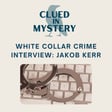
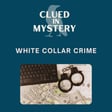
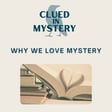
![[re-release] Dorothy L. Sayers image](https://media.zencastr.com/cdn-cgi/image/width=112,quality=85/image-files/61e1c276e3ec42007857cff9/0c9f0c0f-65b5-423a-a129-9414d2b8819e.jpg)
![[Re-release] Christie's Characters: Harley Quin image](https://media.zencastr.com/cdn-cgi/image/width=112,quality=85/image-files/61e1c276e3ec42007857cff9/19b66ded-f629-44f5-8280-f8a4afd4697c.jpg)
![[Re-release] Magic and Mystery with Tom Mead image](https://media.zencastr.com/cdn-cgi/image/width=112,quality=85/image-files/61e1c276e3ec42007857cff9/bf587b93-b2a8-41f6-af97-4772e2c0caa2.jpg)
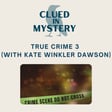
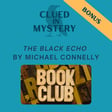
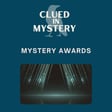
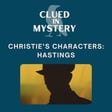
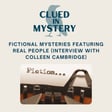
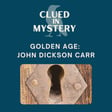

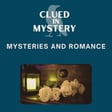
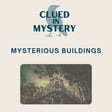
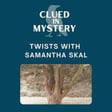
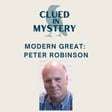
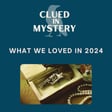
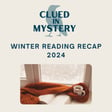
![[Re-release] Celebrity Authors image](https://media.zencastr.com/cdn-cgi/image/width=112,quality=85/image-files/61e1c276e3ec42007857cff9/6bf85c27-5b4b-472c-9f00-1aceb11c14f7.jpg)